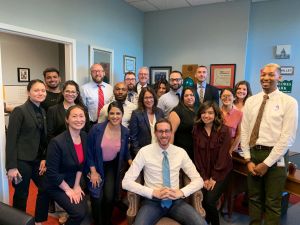The California budget includes a fund for the prevention and control of sexually transmitted diseases

CA01. SACRAMENTO (USA), 12/02/2019.- The governor of California, Gavin Newsom, delivers his first speech on the state before a joint session of the California Legislature this Tuesday, in the House of Assembly in The State Capitol in Sacramento, California (USA).
Photo:
JOHN G. MABANGLO / EFE
The governor of California, Gavin Newsom signed a law last week to expand access to medications for the prevention of Human Immunodeficiency Virus (HIV). The law, known as SB 159, allows pharmacies to offer over-the-counter medications and will take effect on January 1, 2020.
HIV is a virus that affects the immune system. Once weakened this system of defenses allows the appearance of diseases. This advanced stage of HIV infection is what is called Acquired Immune Deficiency Syndrome (AIDS).
However, with the approval of SB 159, medications can arrive on time preventing the disease from reaching or advancing to the immune system.
SB 159 was written by Senator Scott Wiener (D-San Francisco) and Assemblyman Todd Gloria (D-San Diego), co-sponsored by Equality California (EQCA), the country's largest LGBTQ civil rights organization.
With this law, California will become the first state in the nation to authorize pharmacists to provide post-exposure prophylaxis (PEP) medications, which can be delivered in 30-day supplies; and those of pre-exposure prophylaxis (PrEP), in supplies of up to 60 days. Post exposure prophylaxis is a secondary prevention measure aimed at preventing the development of HIV infection after exposure to the virus.
Samuel Garrett-Pate, director of communications for EQCA, said the medicine is currently available but to get it, people must go to a doctor to get the prescription.
"That can take 30 to 60 days," Garrett-Pate said, ensuring they are vital to a person's health.
The law will also prohibit insurance companies from requiring prior authorization before antiretroviral medications, including PrEP and PEP, are provided.
The law is a key step in California's work to eliminate HIV and fulfills the promise of Newsom's campaign to take aggressive measures to end the HIV epidemic.
"Recent advances in HIV prevention and treatment can save lives," Governor Newsom said by signing SB 159 on Monday. “All Californians deserve access to PrEP and PEP, two treatments that have transformed our fight against HIV and AIDS. I applaud the Legislature for taking measures to expand access to these treatments and get closer to ending HIV and AIDS forever. ”

Latinos with a higher risk of contracting HIV
Garrett-Pate said that this law is particularly important in the Latino community since Latino men have the highest rate of HIV transmissions in California.
“And although the Latino LGBTQ community are more exposed, nobody is exempt from becoming infected. HIV does not discriminate, ”said Garrett-Pate.
The Center for Disease Control (CDC) reports that HIV remains a serious threat to the health of Latino communities. In 2016, Latinos accounted for 26% of the 40,324 new HIV diagnoses in the United States and six dependent areas.
87% (8,999) of Latinos who were diagnosed with HIV were men and 12% (1,277) were women. Among men, infections were mostly attributed to sexual contact from man to man. Among women, infections were attributed to heterosexual contact.
Garrett-Pate said that HIV prevention medications are not only for people in the LGBTQ community, as is generally intended, but also for people who are exposed in other ways. For example, those who work with blood or who acquire medications intravenously.
"The side effects are minimal and can prevent the transmission of HIV," said the communications director.
He also said that an effort is being made because the medications reach low-income communities since they are generally covered by medical insurance including Medi-Cal.
The state budget includes a single General Fund of $ 40 million for the prevention and control of infectious diseases and an ongoing General Fund of $ 2 million specifically to address sexually transmitted diseases, as well as an additional ongoing General Fund of $ 5 million for HIV prevention and control.




